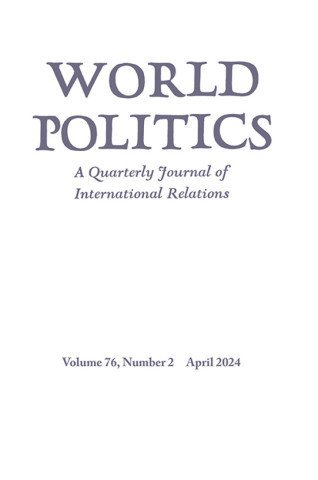Property Threats, Antistatism, and Business Organization in Latin America
IF 2.5
1区 社会学
Q1 INTERNATIONAL RELATIONS
引用次数: 0
Abstract
abstract :Business elites' ability to act collectively is influenced by the scope of their political organization. Within Latin America, large cross-national differences exist on this variable. Some countries have strong encompassing associations that can speak authoritatively for the private sector as a whole, but others do not. This article examines the causes of these differences through a comparative historical analysis of Brazil, Chile, and Mexico. The existing scholarship offers three explanations of variance in business organizational scope in the region, focusing on threats, state encouragement, and the mode of transition to neoliberalism, respectively. This article argues that the explanations involving state encouragement and neoliberal transition are unconvincing. Although the focus on threat is more satisfying, the existing perspective on threat should be refined in two important ways. One is by emphasizing the centrality of threats to private property. Threats of other types may induce temporary cooperation, but what distinguishes cases of strong and enduring encompassing organization is the occurrence of major property threats. The second refinement is to specify that ideas about the state provide the causal mechanism linking threat to organization. Property threats engender encompassing organization by institutionalizing, within the business community, views that underscore the dangers of state economic intervention.拉丁美洲的财产威胁、反国家主义和商业组织
商业精英集体行动的能力受到其政治组织范围的影响。在拉丁美洲内部,这一变量存在很大的跨国差异。一些国家拥有强大的包容性协会,可以代表整个私营部门发表权威言论,但另一些国家则没有。本文通过对巴西、智利和墨西哥的比较历史分析来考察这些差异的原因。现有学者对该地区商业组织范围的差异提供了三种解释,分别侧重于威胁、国家鼓励和向新自由主义过渡的模式。本文认为,涉及国家鼓励和新自由主义过渡的解释是没有说服力的。虽然对威胁的关注更令人满意,但现有的威胁视角应该在两个重要方面加以完善。一是强调对私有财产威胁的中心地位。其他类型的威胁可能会导致暂时的合作,但区分强大和持久的包容性组织的案例是主要财产威胁的发生。第二个改进是具体说明关于国家的观念提供了将威胁与组织联系起来的因果机制。财产威胁通过将强调国家经济干预危险的观点制度化,在商业社区中产生了包容性组织。
本文章由计算机程序翻译,如有差异,请以英文原文为准。
求助全文
约1分钟内获得全文
求助全文
来源期刊

World Politics
Multiple-
CiteScore
8.40
自引率
0.00%
发文量
24
期刊介绍:
World Politics, founded in 1948, is an internationally renowned quarterly journal of political science published in both print and online versions. Open to contributions by scholars, World Politics invites submission of research articles that make theoretical and empirical contributions to the literature, review articles, and research notes bearing on problems in international relations and comparative politics. The journal does not publish articles on current affairs, policy pieces, or narratives of a journalistic nature. Articles submitted for consideration are unsolicited, except for review articles, which are usually commissioned. Published for the Princeton Institute for International and Regional Affairs
 求助内容:
求助内容: 应助结果提醒方式:
应助结果提醒方式:


